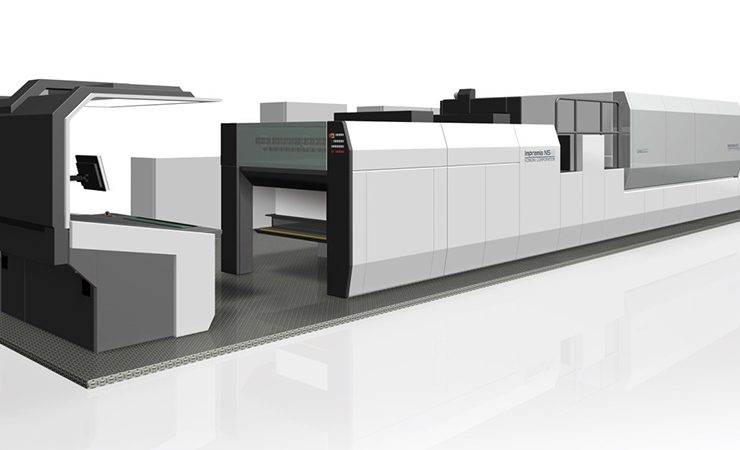Komori is working to set its digital printing system (DPS) business ‘on a profitable track’, and secure and expand recurring income from such technology.
This includes commercialising Impremia NS40, a 40in-wide sheet-fed printing system integrated with Landa Nanographic Printing technology, and delivering greater automation through ‘Connected Automation’ and its KP-Connect platform.
The corporate strategy has been set out as part of the company’s latest medium-term management plan, its sixth to date. This latest medium-term management plan has been extended from the usual three-year period to five years, and covers the period April 2019 to March 2024. This also includes the company’s centennial celebrations in 2023.
Under this new plan, Komori aims to further strengthen business foundations it established in the course of the previous management plan. In line with the theme of ‘Improving profitability and building foundations for growth businesses’, Komori has defined key initiatives to be executed under the new plan. These include:
- Getting the DPS business on a profitable track and secure and expand recurring income, through:
- Commercialising the Impremia NS40;
- Growing Connected Automation;
- Strengthening sales capabilities by taking advantage of Komori’s unique business model that employs a combination of offset printing presses and digital printing systems; and
- Securing a stable stream of profit supported by greater recurring income arising from an increasing number of digital printing systems deployed at customer facilities.
- Improving the profitability of core businesses ¬– offset printing presses and security printing presses –, by:
- Focusing resources on expansion into package printing markets and Asian markets as well as the popularisation of Connected Automation;Stabilising profit by strategically differentiating Komori products from competitors in the security printing press business targeting overseas customers while strengthening service businesses;
- Enhancing competitiveness by re-positioning each product in light of its ability to help customers improve their ROI; and
- Securing long-term competitive advantages by adopting standardised and structured product features and establishing a mass-customisation system via module design and unit production.
- Taking steps to secure future growth of its printed electronics (PE) business by:
- Strengthening manufacturing and sales structures in China;
- Developing and releasing unique products that can differentiate Komori from competitors in printed circuit board and electronics parts markets; and
- Creating new products employing innovative ultra-fine line circuit printing technologies, such as flexible hybrid electronics (FHE), to meet IoT-related demand;
- Progressing with initiatives to increase recurring income from the print engineering service provider business, chiefly by expanding operations capable of securing stable profit from the marketing of supplies, peripheral equipment and digital printing ink and the provision of maintenance services.
These build on the work of the company’s previous medium-term management plan, which set out an agenda to create diversified business portfolio by promoting new businesses, such as DPS and PE, as well as securing the long-term viability of its core interests.
However, the performance of Komori’s offset printing press business, the core of its existing businesses, has been noted as ‘stagnant’ in Europe and Asia, hindering the company from achieving sales growth as planned. Komori’s performance was also affected by delays in the full-fledged release of new models in the DPS business as well as year-on-year sales decreases in the PE and security printing press businesses in the final year of the 2016-2019 plan due to the market cycle that caused the company to encounter headwinds in these operations.
Consequently, Komori’s operating results fell short of the plan’s numerical targets, including net sales. Drawing lessons from these results, Komori stated that it is determined to expand its new businesses at the earliest possible date and, to this end, is striving to fully realise their growth potential. This is to be aided by strengthened sales networks in India and China, which will be used to increase its market share in both markets and improving profitability of existing businesses.





I am not convinced that Komori will ever achieve any real success in the world of digital, their history tells us their foray into digital is blighted by ‘old school vision’.
Whilst, it is acknowledged that their printing press technology is ranked amongst the best and yes they were one of the first press manufacturers to embrace CTP and workflow they do not have the skill sets or knowledge to understand what printing digital means and how this will help their customers.
I sincerely hope that their vision is a success and is ultimately is put into action!